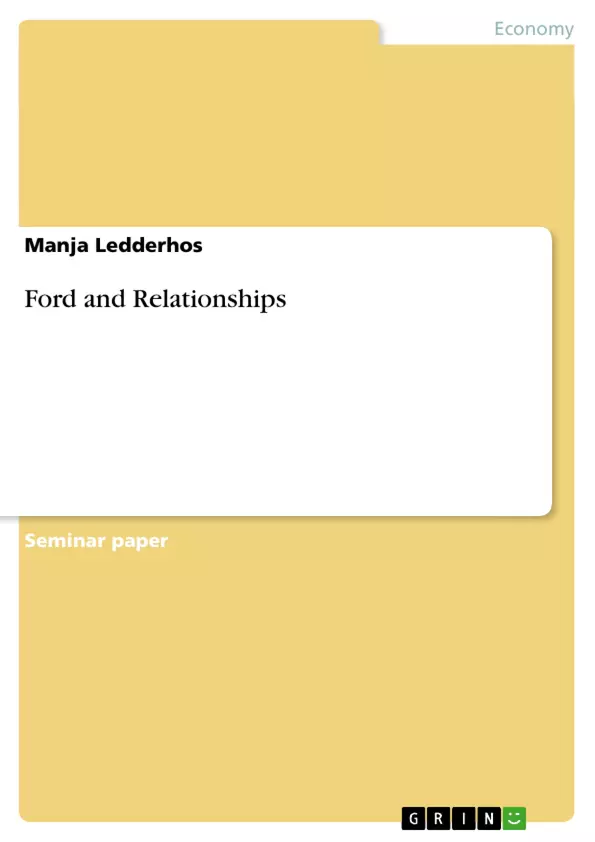In today’s world, companies are part of a complex environment. At the latest with the change from seller to buyer market in the 70s, companies cannot see themselves apart from their surroundings. Technological, economic and social change directly influence companies. The company Ford is one of the best known American automobile manufacturer. They strongly depend on their environment as product specifications need to respond to governmental regulation, economic factors such as oil prices, customer demands or technology standards.
When fierce competition in the automobile market turned the market around during the 70s, Ford seemed to loose market share so quickly to Japanese firms, that the company even had to shut down plants. Ford was found in 1903 and has a long tradition of influencing the car industry. The assembly line is only one example where Ford was able to drop prices for an automobile from 850 to 260 Dollars in 1923 to bring cars to the masses. Though influential in the past, the company seemed to loose against Japanese car producers with only little historic background. A true success story seemed to end during the late 70s and early 80s when losses where at their peek. It is interesting to see, how this situation came across.
In the 90th, Ford was back and introduced superior quality cars. The turning of the company seems to be a hundred percent from completely classical to a more adaptive strategy making. This seems mysterious for such an old and traditional American company.
Inhaltsverzeichnis (Table of Contents)
- 1. Introduction
- 1.1. Background Information
- 1.2. Aim of the Paper
- 1.3. Delimitations
- 2. Analysis: Managing relationships
- 2.1. Past Problems with managing relationship
- 2.1.1. Lead In
- 2.1.2. Leadership
- 2.1.3. Organization
- 2.2. Professional relationship management
- 2.2.1. Lead in
- 2.2.2. Managing internal Relationships
- 2.2.3. Managing external Relationships
- 3. Recommendations
- 3.1. Lead in
- 3.2. Future problems
- 3.3. Future Recommendations
- 4. Conclusion
Zielsetzung und Themenschwerpunkte (Objectives and Key Themes)
This paper aims to analyze the management of relationships at Ford, examining past issues with leadership and organizational structure. It then delves into the development of internal and external relationships that contributed to the production of high-quality cars.
- The impact of leadership styles on organizational performance and relationship management
- The role of organizational structure in fostering collaboration and innovation
- The importance of building internal relationships for employee motivation and commitment
- The significance of external relationships with suppliers and customers in achieving success
- The transition from a classical strategy to a more adaptive approach in the face of market changes
Zusammenfassung der Kapitel (Chapter Summaries)
Chapter 1: Introduction This chapter provides background information on Ford's position in the changing automotive market, highlighting the company's dependence on its environment and the challenges it faced during the 1970s. It outlines the paper's aim to explore the management of relationships at Ford, focusing on past challenges and the shift towards a more collaborative approach.
Chapter 2: Analysis: Managing relationships This chapter explores past issues with relationship management at Ford, specifically examining the company's leadership style, organizational structure, and the resulting problems. It analyzes how these issues led to internal and external isolation, contributing to the decline in car sales. The chapter further examines the concept of professional relationship management, highlighting its significance in fostering internal and external collaboration.
Schlüsselwörter (Keywords)
This paper explores key themes related to relationship management in the context of the automotive industry, focusing on leadership, organizational structure, internal and external relationships, and strategic adaptation in response to market changes. Key concepts include classical strategy, adaptive strategy, internal relationships, external relationships, and the importance of building trust and collaboration for organizational success.
Frequently Asked Questions
What caused Ford's crisis in the 1970s?
Ford struggled due to stiff competition from Japanese manufacturers, rising oil prices, and an inability to adapt its classical strategy to a changing market.
How did Ford's leadership style change over time?
The company transitioned from a rigid, hierarchical leadership to a more collaborative and adaptive approach focused on relationship management.
Why is relationship management important for Ford?
Managing both internal (employees) and external (suppliers, customers) relationships is key to fostering innovation and maintaining quality standards.
What was Henry Ford's contribution to the industry?
He revolutionized manufacturing with the assembly line, making cars affordable for the masses by drastically reducing production costs.
What is an "adaptive strategy" in business?
It is a strategy that allows a company to respond quickly to environmental changes, such as new government regulations or technological shifts.
- Citation du texte
- Manja Ledderhos (Auteur), 2002, Ford and Relationships, Munich, GRIN Verlag, https://www.grin.com/document/11059



